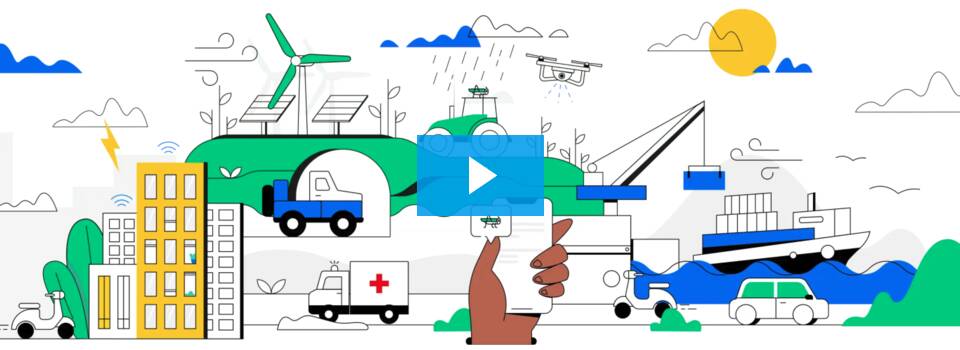Making the UN Global Goals A Reality: Why Trade, Enterprise & Weather Intelligence Matters

The UN General Assembly is this month marking 75 years since it came into being – 75 years of international cooperation, dialogue and work for development #UN75. To mark the occasion, Goals House @UNGA, whose purpose is to bring together many of the world’s most influential figures behind the drive to achieve the UN Sustainable Development Goals, led a week-long series centered around the key themes of the Global Goals, including: how to disrupt global hunger, tech and innovation, the great green reset, clean water and sanitation, restoring the oceans and breaking the barriers to women’s health. As part of this series, ClimaCell.org was honoured to be invited to contribute to an empowering conversation about the future of trade, enterprise and prosperity for Africa, hosted by and broadcast live to Soho House in London, New York and Berlin, and satellite hubs in Abu Dhabi and Kigali.
What an amazing opportunity! Alongside Rt Hon Liz Truss MP, UK Secretary of State for International Trade, and Nimco Ali OBE, game changer activist determined to eradicate FGM in her lifetime, together we focused our discussion on the the role of prosperity, trade and entrepreneurship in securing economic and social progress, especially for empowering Africa’s female future: Why does trade and enterprise matter for prosperity? What can we do differently? Where are the barriers? Where are the opportunities? And we, as ClimaCell.org, got to make the case for why closing the global weather gap is critical to making the UN 2030 goals a reality.

UN Goals House panel discussion with Rt Hon Liz Truss MP, UK Secretary of State for International Trade, Nimco Ali OBE, FGM activist, and Georgina Campbell Flatter, ClimaCell.org
Below is a three-minute round-up of the recording:
We Must Do Everything We Can To Boost Trade and Enterprise In Africa
Look, the bottom line is that trade and enterprise creates opportunity; it creates good jobs and, as Liz Truss rightly said in our panel “If you can control the money in your pocket, you can control your destiny”. Trade and enterprise are enablers of lasting prosperity which can help people lift themselves from and keep themselves and their families out of poverty. BUT, the reality is that there is a huge opportunity left on the table, and local job security is increasingly at risk due to COVID19. Much work still needs to be done to unlock this opportunity and reduce risk. Take Africa’s agriculture sector as an example:
- The Reality: Agriculture accounts for 60% of jobs in Africa and $100M in GDP, and yet Africa remains a net food importer, spending some $35 billion on food imports every year, which is projected to increase to $110 billion by 2025.
- The Reality, Made Worse: 400M people right now face the prospect of reduced income in Africa, that is more the population of the entire USA who are likely to suffer from hunger and could fall into poverty this year, with women disproportionately impacted. COVID19-related trade disruptions is one of the major drivers behind this income loss with $5B of African agricultural export value at risk, primarily due to disrupted supply chains and a decrease in demand from Europe, Asia and the USA. When trade increases, so does local prosperity. When trade and enterprise decreases, people lose income and go hungry. And remember, when 80% of your income is spent on food, even a moderate reduction in income will lead to skipping meals, hunger and worse case famine.
- The Opportunity: Whilst we are limited in our ability to control the disastrous global impacts of COVID19, we can channel our efforts into improving and building the resilience of trade and enterprise through other means. Hope exists in innovation and technology and there is massive untapped potential across the continent. Africa accounts for 60% of the world’s arable land but only contributes 4% to the total output. The average African farm still only performs at only about 40% of its potential. It is predicted that Africa could improve productivity 2-3x with tech and specific interventions. We must do everything in our power to enable Africa to reach its full potential through enterprise and trade.
The Case for Weather Intelligence- A Critical Input For Trade and Enterprise
So, how can Africa reach its full potential? What can we do to boost trade and enterprise? What can we do to create jobs and drive African prosperity? These were the crux questions at the heart of our UN Goals House conversation. Several powerful examples were shared by the panel that highlighted the critical importance of trade policy, access to finance, access to education, access to healthcare… All critical systems inputs that are necessary for entrepreneurs to survive, thrive and generate local wealth. Now… let me make the case for why knowing the weather must be added to this wishlist.
Every business globally is exposed to a climate that is changing. $2.1 trillion of annual global GDP variation is associated with weather variability. Knowing the weather helps business and individuals manage this variability, with researchers, estimating the annual economic value of weather information to the global economy at over $150 billion. You need to look no further than the commercial case studies shared during ClimaCell’s recent virtual ClimaCon – each customer (Fox Sports, NFL, Uber, IndiGrid…), each clearly making the case for why knowing the weather and more specifically weather intelligence matters to their business, their bottomline and their growth. Take construction for example. I heard a powerful story from a multi-million construction company out of Texas recently. They use ClimaCell’s weather intelligence every day to help schedule their work and keep workers safe. “If you’re sending a team at 10pm to do a 12 hour concrete pour, you want to guarantee it will not rain. Getting it right the first time is important to stay on budget, on schedule [and it’s better for the environment]; Or a team working on a high rise building, you need to know wind speeds and lightning direction with certainty. Every hour not up there, impacts budget, but equally safety comes first”
But while a business in Texas has the luxury of hour-by hour reliable forecasts to manage weather variability, keep workers safe and boost income; a business owner in Nairobi does not have that luxury. Think of the savings across the major African industries if they had access to weather intelligence. Kenya’s construction market is currently valued at $625M, logistics and transportation is $5B; Power and utilities is $15B. Even if you assume a 5% savings across these industries in Kenyan alone(which is entirely possible with weather intelligence), you’re talking about billions of added value to the economy.
Back to agriculture for a moment. It has been estimated that the agriculture sector in Africa could be 2-3x more productive. For this reason, significant resources are currently being channeled towards improving the adoption of modern agricultural inputs, especially for smallholder farmers – irrigation technology, fertilizer and pesticide, more profitable seeds… But none of this matters without weather forecasts. In fact, the effectiveness of these inputs can vary by up to 50% due to unpredictable rains. A female farmer from Kenya recently adopted a very cool new irrigation system. She can’t benefit from the technology fully as the practical application depends on knowing the weather. And she has already been caught by unpredictable weather several times this past year, losing yield, equipment, time, money, and income.
Rains Do Not Need To Be Unpredictable
But the weather doesn’t need to be unpredictable. There is a lot of work we need to do as a system to close the global weather gap for the 5 billion who are currently underserved by traditional technology. The good news is that the technology exists and it’s 10x better, cheaper and simpler today than even 10 years ago. Now it is a matter of working together to ensure these technologies get implemented sustainability, inclusively and at scale on the continent. By unlocking the possibilities of weather intelligence for everyone we can make the UN goals a reality. This is our mission at ClimaCell.org.
This blog post originally appeared on the ClimaCell blog and was authored by Georgina Campbell Flatter, Executive Director of ClimaCell.org
For more on the topic of how trade and enterprise impact emerging market growth, join us for a special webinar on October 14th at 9:30am ET.




